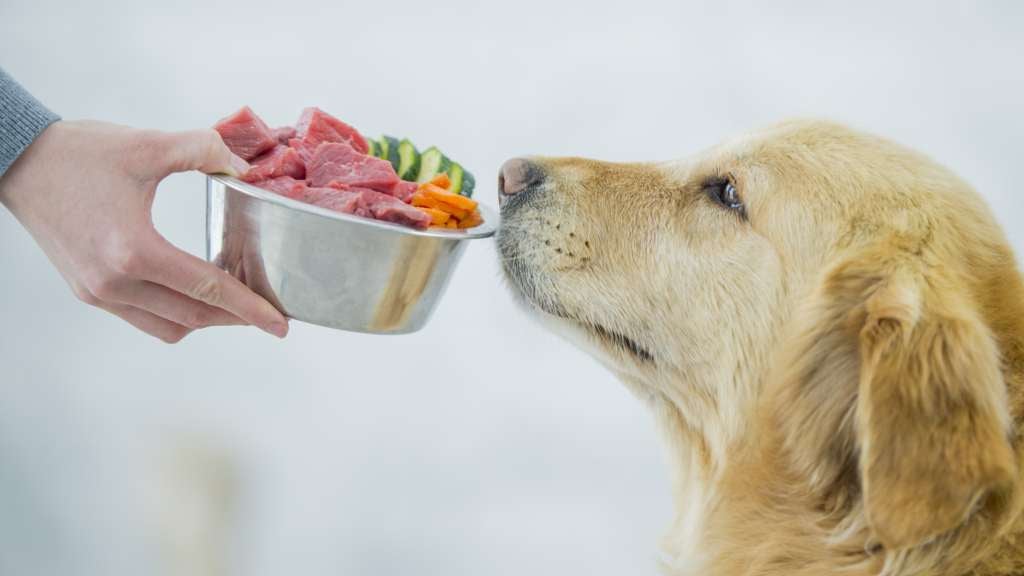Dr. Holly Boyden
BVSc (Merit) MANZCVS (ECC)

Most pet-parents know that keeping tails wagging starts with a bowl full of the good stuff – a nutritionally complete and balanced diet that keeps their dog happy and healthy.
However, we’ve all probably given in to the temptation of treating our canine bestie to a few yummy ‘human food’ snacks on the side! But did you know that some common human foods can be harmful or even toxic to dogs?
So, before giving in to those soulful puppy dog eyes, read on to learn more about which human foods are safe and which ones you should never feed to your furry friend.
Just like us, every pet is different! Their ideal diet depends on where they’re at in life (puppy zoomies, adult adventures, or golden years), how active they are, any health quirks they might have (like chronic kidney disease), and sometimes even their breed (we’re looking at you, Dalmatians and your low-purine needs!)
Veterinary-recommended commercial dog foods are formulated to be complete and balanced for a variety of life stages and medical conditions. This means that they meet nutritional standards for containing macronutrients (protein, carbohydrates and fats) and micronutrients (vitamins and minerals) in the right quantities and balances required to keep your pup healthy in the long-term.
Unless prepared under the guidance of a board-certified veterinary nutritionist, home-cooked diets are frequently deficient in key nutrients, which can sadly lead to health problems down the track for your pet.
That’s why it’s always best to check in with your vet – they’ll help you pick the perfect diet to keep your four-legged friend feeling their best.
Before sharing any human food with your pet, it’s important to be aware of the common human foods that can be toxic to dogs and therefore should never be fed to them. While those puppy-dog eyes can be hard to resist, a little treat from your plate could do more harm than good.
Here are some common foods to avoid feeding to your dog:
While not technically toxic, the foods below are known to cause tummy troubles in dogs, so it’s best to keep them off the menu. Keep these ones far away from your fur-baby!
If you want to spoil your pup with a little something from your plate (and they don’t have any known food sensitivities), it’s totally fine to treat them now and then with small amounts of dog-safe goodies like:
Keep in mind, sudden menu changes can upset your dog’s tummy, so it’s best to introduce any new foods slowly and in small portions to keep things running smoothly.
In many cases, dogs access unsafe human foods by stealing them! Reduce the risk of your dog cheekily helping themselves to dangerous foods by:
Having pet insurance will also help to alleviate the costs of veterinary care for your fur-baby in the case of any potential toxin-related unwellness episodes.
We get it, accidents happen! Whether your dog unexpectedly snatched some snacks from your toddler’s plate or raided a bin, if you suspect that they may have eaten a potentially harmful or toxic food, it’s best to contact your vet or the Australian Animal Poisons Helpline immediately for further advice.
Time is of the essence with potential problem food ingestions. In some cases, dogs can be medically induced to vomit up toxins or foreign bodies before significant harm is done. Otherwise, vet treatment (such as the administration of appropriate antidotes or supportive care) can be started early to help minimise your pet’s chance of becoming significantly unwell.
When it comes to healthy food for your canine companion, aim to provide the majority of their nutrition through either a high-quality commercial dog food or a home-cooked diet fed under the instruction of a certified vet nutritionist. If you decide to jazz up your pup’s meal with a little ‘human food’, just make sure it’s safe for their belly – no sneaky toxic treats allowed!
Want to take the guesswork out of mealtime? Chat to your vet for personalised diet tips, and protect your pup’s health (and your wallet) with Buddy Pet Insurance. Get a quote today and find the paw-fect cover for your best mate!
15 May 2025